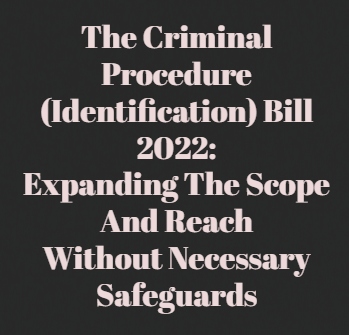

By Our Editorial Team
First publised on 2022-03-30 10:09:13
The main problem with new laws or amendments to existing laws that are introduced or carried out is often that they are poorly drafted, do not take into account conflicts with other existing laws or are never designed with the thought that they will pass the constitutional test. Further, most of the terms used in the drafting are vague, arbitrarily used or not properly defined. That makes these laws prime candidates for being challenged in courts. Hence, the main purpose of these laws - that to simplify things and reduce legal wrangling - is never achieved and instead they become the subject of numerous court cases.
The Criminal Procedure (Identification) Bill 2022, introduced in the Lok Sabha recently, is an example of one such law. It is no one's case that police investigations should be done with reference to outdated laws (in this case the Identification of Prisoners Act, 1920) since the tools of investigation have changed with rapidly changing technology. There is definitely a need to update the law. But such upgrade cannot be at the cost of violation of right to privacy. What the new bill essentially proposes to do is to collect a huge amount of data from an expanded list of persons by even a head constable. This data will include fingerprints, palm-print impressions, foot-print impressions, photographs, iris and retina scans, physical, biological samples (which can include taking hair and blood samples for DNA profiling), signatures, handwriting or any other examination prescribed in the Code of Criminal Procedure and some of it without the sanction of a magistrate, as is now the law. It seeks to make the police or other investigating agencies the sole judge of whose and what data to collect.
The Bill, as it stands, is not likely to pass the test of constitutionality as it uses vague terms, does not provide assurance of data protection and violates right to privacy, among other rights. It should be redrafted before being made law to ensure that the legitimate interests of the state are served without violating the rights of the individual.











